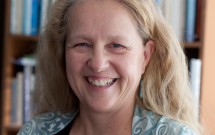
By Awbrey Michelle Willett
I set out using each of my classes here at Southwestern to grow as a person, and to study self-care, and the various occupational hazards of caring, in order to understand how counselors and those of service, including myself, can sustain our work and live optimally well, balanced, and joyful lives. It is sometimes helpful to differentiate between the various occupational hazards, such as burnout, compassion fatigue, and vicarious trauma. One way to think of the various possible hazards is on a stress continuum. On one end a person is experiencing a slightly aroused nervous system, which is necessary for learning. I have always called this, the sweet spot. The continuum progresses from this helpful just right amount of stress, through stress that is moderate but unhelpful, to trauma. As we move down the continuum and begin to move away from the sweet spot into stress and trauma, we experience reduced wellbeing. For our purposes, “the challenge lies in the fact that wellness is a concept that we as counselors offer more readily for our clients than ourselves” (O’Halloran, 2000).
All three of the counselors and teachers I interviewed, Ann Filmyer, Jason Holley, and Katherine Ninos didn’t see the issue of self-care as an ethical dilemma. Their attitude in sitting with a client was one of “reciprocity.” Thus, self-care at its deepest level was client care and vice versa. According to Jason, “if you are truly tending to what you need, at a deep level, then you will be doing what everybody needs, listening to process, listening to Eros, listening to life. Then you can’t do anything off course.” And when you do find yourself off course Ann suggested that you, “find your compass! Cuz stuff is going to happen.” Ann, Jason, and Kathrine recognized that standing with something greater than ourselves (“The source,” “Eros,” and “The Oneness” respectively) as well as standing in alignment with ourselves gives us strength. This shared understanding of something greater that dwells within us was perhaps the most common thread between colleagues, one that set the stage for a much larger conversation, for which I am deeply grateful.
I began each conversational interview by asking, what is self-care to you? Self-care is the most common term used in the literature and is defined as, “a process of recognizing one’s physical, emotional and spiritual needs, and finding personal flexible ways of meeting these needs” (Brownle, 2016). I discovered in our conversations that we were really talking about spiritual-care, self-care, and self-love. I see wellness as a life-long process, a process of human development moving toward more health and wholeness. I have personally struggled to care for myself while caring for others at different points in my career. In personal pursuit of wellness, I have dedicated myself to learning about the occupational hazards and possibilities of the helping profession, and am currently, integrating, and sharing, what I have learned.
I recognize that mapping the path toward successful self-care is kind of like solving the great mystery of life, thankfully, as Ann put it, “there are many ways, but they all lead to the same source.” The American Counseling Association’s adoption of a code of ethics regarding “self-care, healthy boundaries, and consulting” (Merriman, 2015) additionally demonstrates the professional belief that self-care has become a central ethical consideration within the counseling field.
References:
Brownle, E. (2016). How do counselors view and practice self-care? Healthcare Counselling & Psychotherapy Journal, 16(2), 15-17.
Merriman, J. (2015). Enhancing Counselor Supervision Through Compassion Fatigue Education. Journal of Conseling and Development, 93(3), 370-378.
O’Halloran, T. M. (2000). Stress on the Job: Self-Care Resources for Counselors. Journal of Mental Health Counseling, 22(4), 354.
 Southwestern College Santa Fe, NM
Southwestern College Santa Fe, NM



